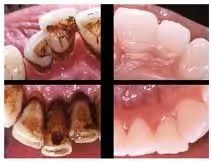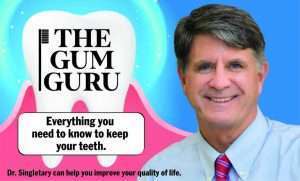These days most people are aware of the negative effects of smoking upon their health. And you’ve probably heard it said at least once–smoking is bad for your mouth. It’s true. Smoking is especially detrimental to individuals’ oral health. It causes a number of periodontal problems and exacerbates numerous pre-existing conditions. But why and how, exactly, does smoking increase people’s risk for gum disease?
Saliva naturally helps cleanse the mouth of bacteria, but smokers produce less saliva than non-smokers. Since smokers salivate less, they are more likely to produce this harmful bacterial plaque, which then turns into hardened plaque (calculus). If left untreated, the buildup of bacterial plaque produces gum disease because the bacteria destroys the bone and soft tissue that anchors the teeth to the jawbone. As the gums break down, the teeth may loosen and even fall out. As a result, smokers are more susceptible to a rapid onset of gum disease and tooth loss.
Also, smoking masks signs of periodontal disease that non-smokers more easily notice and take measures to prevent. For example, if your gums bleed, it is often your human body’s way of indicating that you may be entering the early stages of periodontal disease. The bleeding, however unpleasant, warns you to take preventive steps to reverse gum disease. However, smokers sometimes don’t experience bleeding gums because smoking prevents a proper supply of blood from circulating to the gums. Since smokers have much less bleeding in their gums, “This can lead to the false impression that the gums are healthy. It is therefore very important that tobacco smokers have regular dental exams to evaluate their gum health.” Compared with nonsmokers, smokers often miss the warning signs of early periodontal disease.
Lastly, smoking makes successful treatment of gum disease increasingly difficult. The poor bone healing and lack of salivation and blood flow in the mouth caused by smoking make it progressively harder to alleviate or reverse periodontal problems. Since the mouth cannot as easily or efficiently repair or clean itself, periodontal procedures will be less effective or long lasting.
Fortunately, even if you used to smoke in the past, that does not mean that you are doomed to have diseased gums. If combined with daily care for your teeth and gums, regular visits to your oral care professional, and a healthy diet, quitting smoking greatly reduces your chances of developing gum disease.

For more information on this topic, listen to the Gum Guru Podcast by clicking the link below:
